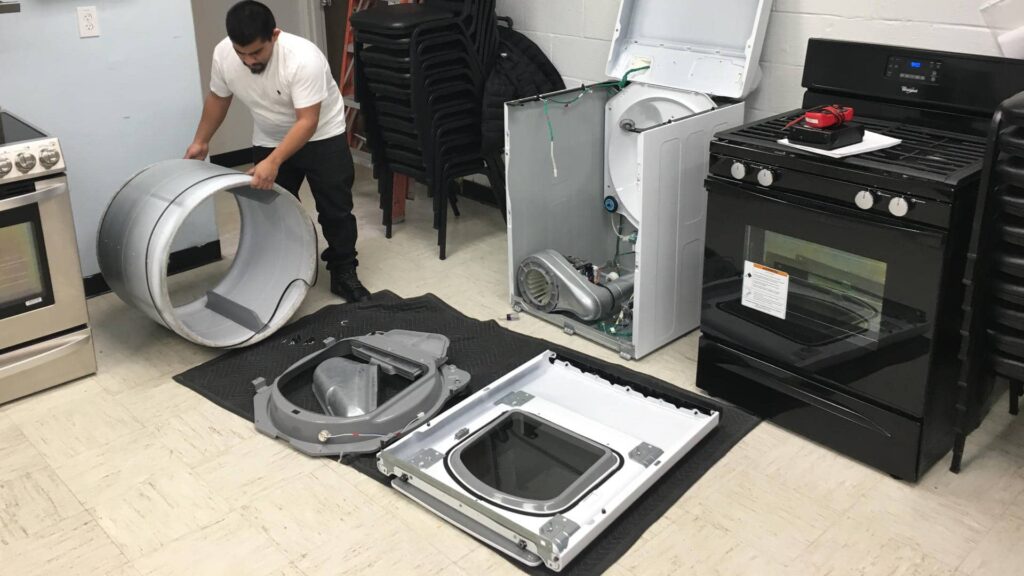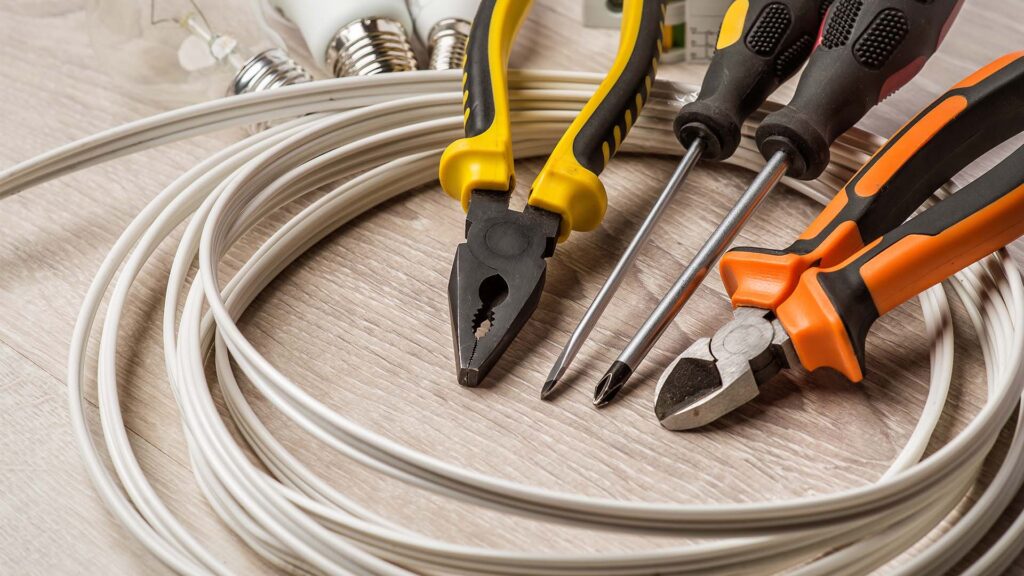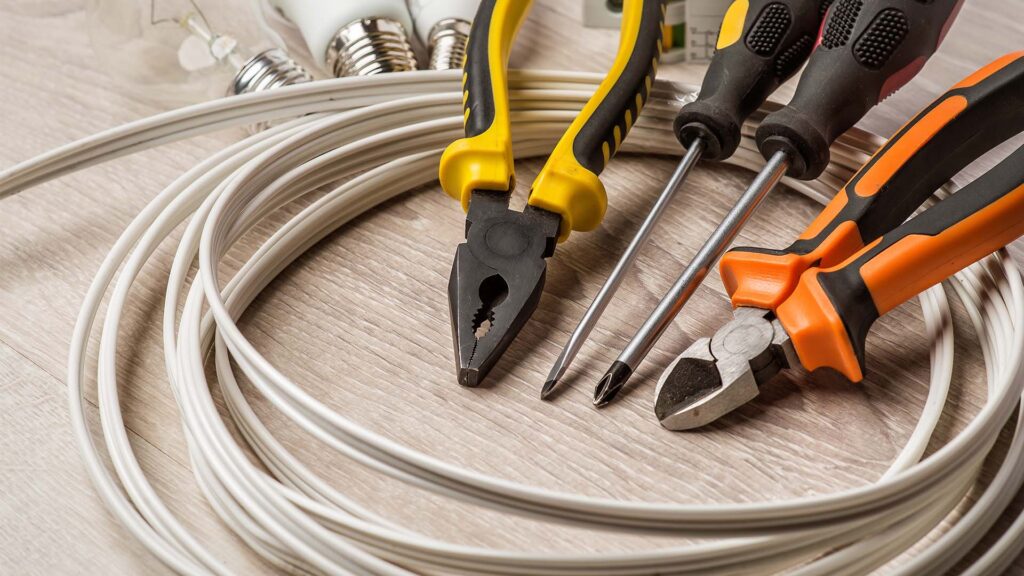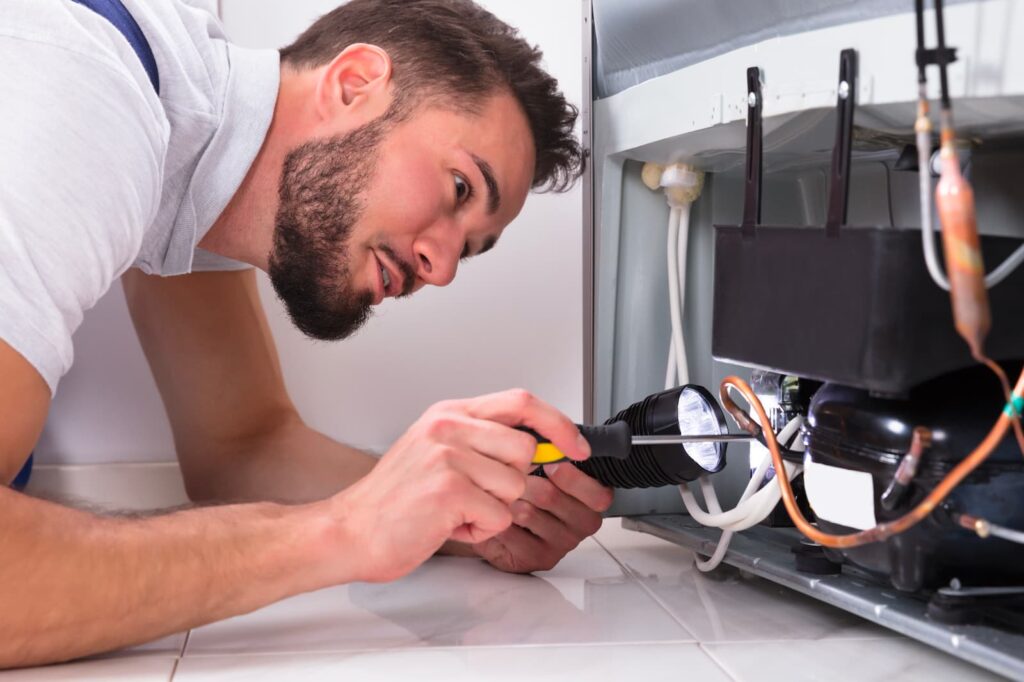The art of appliance repair goes beyond tightening a few screws or replacing worn-out parts. It’s a challenging field that demands knowledge, skills, and more importantly, the right training. This blog post aims to unravel the essential training and courses that will put you on the path to becoming a proficient appliance repair technician. Join us as we delve into the nitty-gritty of appliance repair training, unlock industry secrets, and arm you with the knowledge necessary to excel in this industry.
Understanding the Basics of Appliance Repair

Source: academy.fredsappliance.com
The road to becoming an appliance repair maestro starts with the basics. The fundamentals of appliance repair include a strong understanding of electrical systems, mechanical components, and the common issues that often plague appliances. But why are these fundamental areas so important? In a nutshell, they form the foundation for advanced repair techniques.
Knowledge of basic electrical principles, for instance, allows technicians to safely navigate the myriad of wires and circuits found within appliances. On the other hand, understanding mechanical components such as motors, belts, and valves equips technicians with the ability to identify and resolve physical faults in appliances. Basic training, therefore, establishes a strong foundation upon which technicians can build their knowledge and enhance their appliance repair skills.
Electrical Systems and Troubleshooting
A deeper dive into the realm of appliance repair reveals the pivotal role that electrical systems play. Every modern appliance, from your humble toaster to the complex refrigerator, incorporates electrical systems. Grasping the basics of electrical circuits, interpreting wiring diagrams, and observing safety protocols are, therefore, critical to effective troubleshooting.
Training programs offer systematic approaches to identifying and resolving electrical issues. These skills, coupled with a keen eye for detail, are what separate the novice from a person who underwent appliance repair course. Mastery of electrical systems and troubleshooting techniques is the key that unlocks a deeper understanding of how appliances work and how to fix them when they falter.
Mechanical Components and Repair Techniques
Beyond the wires and circuits lie the intricate mechanical components that drive an appliance’s functions. Whether it’s the agitator in a washing machine or the cooling fan in a refrigerator, each mechanical component plays a unique role in an appliance’s operation. Understanding these components and their interactions is another vital step on the appliance repair journey.
Different repair techniques come into play when dealing with mechanical issues. Sometimes, a faulty part may need replacement, while in other cases, a simple adjustment might suffice. Effective training equips technicians with a broad set of skills and tools to handle diverse mechanical issues, setting them on the path to becoming all-rounded appliance repair experts.
Diagnostic Tools and Equipment

Source: academy.fredsappliance.com
Just as a painter needs brushes or a chef needs knives, an appliance repair technician’s work relies heavily on specific tools and equipment. Diagnostic tools such as multimeters, clamp meters, and specialized testing devices are crucial in identifying and fixing faults in appliances.
Knowing when and how to use these tools is an art honed through training. Correct usage can mean the difference between a swift repair and a time-consuming trial-and-error approach. Training sharpens a technician’s ability to choose and effectively utilize the right tools, making them indispensable assets in the world of appliance repair.
Specialty Appliance Repair
While a broad understanding of appliance repair is essential, specializing in specific appliances can offer an edge in the market. Each appliance category, whether refrigerators, washing machines, or ovens, comes with unique features and repair considerations.
Training in these specialties expands a technician’s knowledge base and enhances their expertise. It not only makes them more versatile but also opens up more career opportunities in the appliance repair industry.
Safety and Compliance in Appliance Repair
Amidst all the technical know-how and skill development, safety and compliance cannot be overlooked. Understanding safety protocols, electrical hazards, and proper handling of appliances are just as crucial as knowing how to fix them.
Training ensures that technicians are well-versed in industry standards and regulations, minimizing the risk of accidents and promoting a culture of safety. A technician’s adherence to safety protocols also contributes to their professionalism, earning them the trust of customers and peers alike.
Manufacturer Training Programs

Source: academy.fredsappliance.com
Manufacturer-specific training programs are another valuable avenue for appliance repair education. These programs provide in-depth knowledge of particular appliance brands and models, taking a technician’s expertise to new heights.
Participating in manufacturer training not only enhances a technician’s credibility but also gives them an edge in repairing appliances of specific brands. This specialized knowledge is invaluable in a market where brand loyalty is prevalent and customers prefer technicians who are familiar with their particular appliances.
Apprenticeships and On-the-Job Training
Classroom knowledge is vital, but real-world experience is what cements the learning. Apprenticeships and on-the-job training offer a hands-on approach to learning, placing aspiring technicians under the guidance of seasoned professionals.
These training methods offer real-world scenarios and problem-solving opportunities that are hard to replicate in a classroom setting. They accelerate skill development, honing a technician’s abilities and preparing them for the challenges of appliance repair.
Continuing Education and Professional Development
The field of appliance repair is dynamic, with new technologies, industry trends, and repair techniques continually emerging. Staying updated through continuing education is therefore crucial.
Continuing education not only enhances a technician’s expertise but also gives them a competitive edge. It fosters a culture of learning and growth, positioning technicians for success in the ever-evolving world of appliance repair.
Certification and Licensing

Source: ccppcj.ca
In a field where credibility and trust are paramount, certification and licensing cannot be ignored. Customers look for these markers of quality when choosing a technician, and industry-recognized certifications serve as proof of a technician’s competence.
The process of obtaining certification and licensing can be rigorous, but the benefits are worth it. These credentials boost a technician’s reputation, open up job opportunities, and can lead to higher earning potential.
Conclusion
Appliance repair is a field that calls for comprehensive knowledge, diverse skills, and continuous learning. From understanding the basics of electrical systems and mechanical components to acquiring advanced diagnostic skills and specializing in specific appliances, each aspect of training is a piece of the puzzle that makes up a competent appliance repair technician.
The journey doesn’t end with training. Embracing ongoing education, obtaining industry certifications, and learning on the job are crucial to staying ahead in this dynamic field. Aspiring technicians, armed with the secrets and insights shared in this blog post, are well on their way to a rewarding career in appliance repair. Now, it’s time to put these lessons into practice and unlock your potential in this exciting field!


